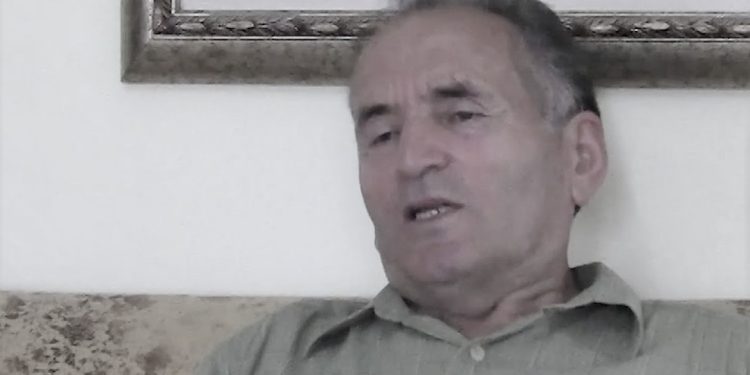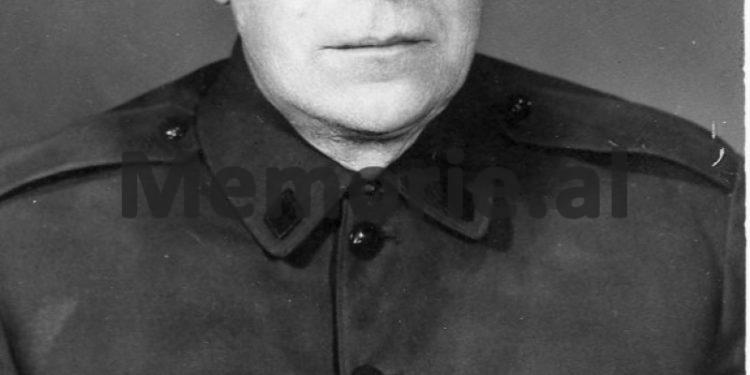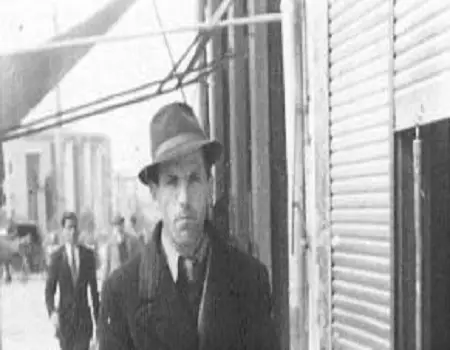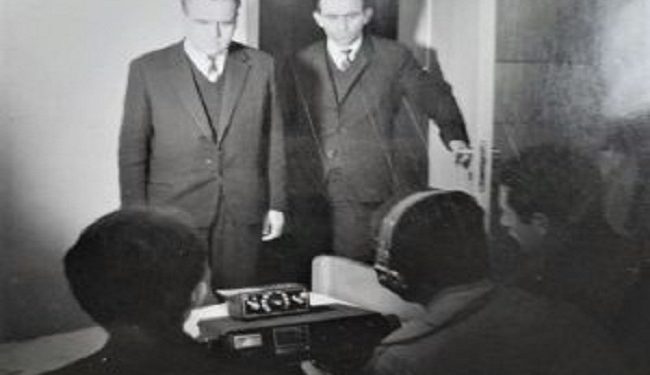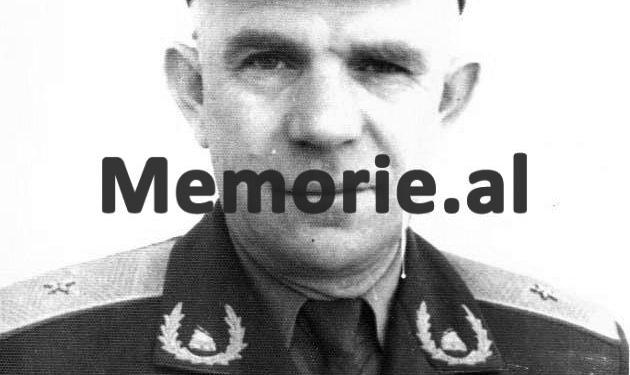Memorie.al / My father were one of those brave men, when they took him to be shot, he cried: “Amanet Albania”. That call would encourage for years the fellow prisoners who remained alive, as his son, Jonuz Kulla, tells us. Meanwhile, the family would continue the severe persecution. Nevzat Haznedari himself would be at the head of this persecution, who 23 years after serving as a prosecutor in the trial where Ajdin Kulla was sentenced by shooting, ordered the deportation of his son and his wife to the Dumre camp. For more about this tragic story of this family, check out the interview with Mr. Jonuz Kulla.
Mr. Jonuz, who was your family and how did the persecution against you begin?
I was born in 1943 in the village of Zęblak in Korça. I am the son of a large, patriarchal family, who lived together, was in harmony, fought and worked with the sweat of their brows and managed to live together up to 43 people. They built a big house and life looked exactly like a quiet Albanian family. With the advent of fascism, as a family with patriotic traditions, because my grandfather, Jonuzi, was a well-known patriot in the Korça area, they joined the National Liberation Movement. Grandfather’s brother, Ganiu, at the Peza Conference, was appointed chairman of the National Liberation Council of the village and only when, the Communist Party, we are talking about, not the National Liberation Movement, under the influence of the Yugoslavs, broke the famous Mukje, which was a union of Albanians for secondly, almost like the League of Prizren, then the fratricide began, with the murder of 6 boys in Ziçisht of Devolli, i.e. a signal of the civil war, uncle Ganiu with the prayer of the circle of “Balli” of Korça, Fazlli Frashëri, Jorgji Dilo, etc. , begged him to unite the boys and create the detachments of the ‘National Front’ and as a sign of honoring those six boys, this gang, which later, very quickly became a battalion, was named the “Six Martyrs” battalion.
What was the purpose of this gang?
To protect the lives of Albanians who were endangered by the communist plague, not by the National Liberation Movement. They also thought, since it was on the edge of the border, as history showed, that the Greeks could come and retaliate, they created these detachments. Several times they tried and cooperated with the leaders of partisan groups such as; Riza Kordheli, Agush Gjergjevica and many others. There were also talks, but then it was impossible. On this occasion, my father, who graduated from Fultz’s American school, got involved. He did his last year in “Normal” in Elbasan. He served 10 years as a teacher in Moglica, Pustec, Pojan, and only when this movement was created, he joined the “National Front”, did propaganda to clarify what the National Liberation Movement is and what the communists’ goal is. In 1944 they tried several times, even at the end of 1944, to cooperate or stop it. They stopped the activity; they saw that it was useless. There were good people, like the Vinçani family, to stop the war, but the betrayal was inside, so he left all the way to Shkodër and only when the false slogan “who has not committed crimes, come back, because we are brothers”, returned, was arrested.
Those who surrendered, were they punished?
His father and uncle were sentenced to be shot and executed in July 1945 in Bilisht. This is where the catastrophe of this large, healthy family began. They arrested the father’s younger brother, uncle Xevit. He was about 19-20 years old. They accused him of useless things, as if he wanted to escape to Greece, as if he was sabotaging the army, because he was a partisan, with a brigade, and they sentenced him to death. Thanks to a family friend, who was a judge, he quietly passed this death sentence to 101 years and after a great ordeal in Burrel, this was the first prison, he returned home. An unforgettable and unrepeatable example is the case of his fiancee, the daughter of the Dervish of Bilishti, Mrs. Fehmie, who was engaged to him for 11 years and only when he was released from Burrel prison, they got married and had two children. We stayed in the village. Life was hard. In 1947, they arrested all the men of the family without exception, with the sole purpose of helping General Prenk Pervizi to escape, and their punishments would have been very, very severe, if those maneuvers had not happened made the kuçedra Enver Hoxha, that “Koçi Xoxe is to blame for these reprisals” and reduced his sentence: who 12, who 7, who 5 and escaped from death. We remained in the village only the women and the youngest children.
What happened to your family afterwards?
The older boys, sensing the danger, as happened to their parents and they had news from the village, from reliable people of the village who will arrest you, make you, took flight and fled, most of them, to Greece. We were left without support, without land, without cattle because they confiscated everything and the most catastrophic, which I will never forget, my eti’s library, which was a teacher, his photographs, his manuscripts, even national costumes, when they seized us the house, they took them, put them in the yard and burned them. These were the first signs of what was to come. We were sheltered in the village by friends of our family, in a room, a room and a half, and after these boys also fled, and then they sent the State Security at night, in cars covered with raincoats, at midnight. They brought in children, old men, old women because these were the ones left, just like the Gestapo when they said, that we had seen in movies, and they sent us to “Hanin Me 2 Porta”. There they kept us in prison for two weeks, in exceptional conditions, up to 46-47 people in a room, like sardines that is. A lot of people got sick, a lot of old people got sick, and after two weeks of sifting, they decided that the people who were a little older and who were thought to be able to escape, they took them and took them to the internment camps. We who had no chance, small children, mother and grandmother and a son of my uncle, who separated him from his mother, from his brother, from his sister… he was about 11 years old, and they left him with us. We returned to the village, without any support, without a house, without land, without cattle. Think what a life we’ve led.
How did you cope with life?
We sorted the fields at harvest time and collected wheat ears; put them in sacks from morning until late evening. There we would beat them with wooden sticks, take out the grains of wheat, our mothers, instead of animals, would load them on their backs, take them to the mills of Zvezda and Gollobera, which were quite far away, and they would keep us with them. Or with some boiled potatoes. Or, the masterpiece is, an aunt of mine who was very practical, she boiled herbs for us that were found in the fields, but which were not harmful, not to mention nutritious, and kept us alive for years, that is. This was our life. What a protection, it’s funny, but we had a distant cousin of ours, she was unfortunately mentally ill, but for us she became the number one shield. She didn’t allow any of us children to touch us, or curse us, or insult us by throwing stones at us. I’m not saying that in the village, there were no good people; there were people who were afraid, as communism introduced fear. They helped us. Someone would bring a piece of bread in their pocket and leave it in the corner. Someone would bring a bottle of buttermilk and leave it in the garbage outside the house where we lived, he would signal to us. Someone would bring ears of wheat, throw them into the ditch and signal to cut them and take them. This is how our life passed, difficult.
Did they give you a job?
The mother began to go to work, through reclamations that were used as sewers, to get a bucket. Then they fired him and from there. When he was released from internment, the aunt with his uncle’s son, Nesheti, and their sister, Mukades, this boy Nesheti ran away at the age of 14 and a half, he left home to find a solution and went to work for a while in Tirana, for a while on Cërrik’s farm…and through him, he gave us some triska that we used to collect food, as it were. Our great luck is that we left for Elbasan too… how did we get shelter in Elbasan? An aunt of mine had a cousin of hers, an officer, who worked in Krastë, but the military ward had given him a room, at the Zenel Hoxha family. He was a wonderful boy; he allowed us this room and even went to sleep in the ward himself. His last name is Zaimi, there are two or three honorable boys who are still in Elbasan today.
What year did this happen?
This happened in 1952. We took shelter there for a while, our mothers: Aunt Fatima; my mother, Fidarija; uncle’s daughter, Mukadesi, a star girl, about 20 years old, they worked in construction, in making stone pits in Zaranik, in Shkumbin, across the streams, in construction, in reclamation, in the heaviest jobs, together with other women honorable people of Elbasan, like Mrs. Gurmani, like Mrs. Kazazi, Haxhiademi, Stringa, Baholli, lest I forget someone, Harja, because I don’t remember them all. All honorable ladies. To humiliate them, they sent them to the hardest jobs and to insult them. Yes, they were forced to work, to keep their children alive. Some of them have passed away, may God bless them, are there any, or are they no more, but in our minds and hearts they will remain the most honored women of the city of Elbasan. We continued here for a while and there were 11 of us, we lived in one room because the great uncle, Beluli, returned from prison, after a while Xhevit also returned from Burrel. It’s ironic and laughable, but people should know: we were in one room, 11 of us, we didn’t have a place to get married, and the fiancee waited 11 years. Then, someone, a kind soul, gave us a military tent and in a corridor that was there, open, without glass, without anything, leading directly to the yard, we shared a corner like this, we put a bed there and the married man lived there for a consecutive year. This was our life…!
How is your life going?
I continued the 7-year-old at “Kostandin Kristoforidhi”. I was a good student. My father’s former friends, because my father finished, as I said, Fultz’s school and in the fourth year he came to Elbasan, to Normalen, but Elbasan had many of his friends who had graduated at the same time as Mr. Bejtja, Tahsim Daiu etc. etc. and without being noticed, they told the mother: “don’t leave the boy without school because he is very good”. Then, going to Tirana, I registered as an external student at the “November 7” Polytechnic. There were also the quiet years, ’56-’60s. In this period, in order not to be misinterpreted, even by many co-sufferers, they say: “How did he finish school”?!, from 1954, 1952 to 1960, he had some right to continue school. Many people from Elbasan graduated from Pedagogy and went on to become teachers. Someone continued high school at night, of course with some intervention, but without that big communist hammer. And I enrolled in the Polytechnic. I finished with very good grades and returned to Elbasan in the 60s. Then the big ordeal began because in those forms we filled out after school, you had to write your biography.
Did you write what the form asked for?
Even though I was young and immature, someone told me, write that if they beat him later, you will find trouble, and I wrote that I have escaped people, my father was shot. This served to leave me without a job for a year and a half, although I was a mid-level technician, the country had an extraordinary need, and only after a year and a half, some unknown but good-hearted person gave instructions for me to work in the Cooperative of Artisans of Elbasan where there were blacksmiths, sheet metal workers and these…! And there I opened a small department, where I did engine windings, which was a rarity, of engines, which was a rarity for that time. Things stabilized well. I began to have a good income and we said that we were saved from the great evil, from the ordeal that we had gone through, but no, it was not said! In Elbasan, unfortunately for us, came the chief criminal, I repeat the chief criminal of Albania, Nevzat Haznedari. This man had been at the same time as my father, I don’t know in the class, or in a parallel class, or further back, but the worst student in the Elbasan Normal School. A man, since fascism came, wore the shirt of fascism and after that, a partisan and communist from the first hours. This one took part as a prosecutor of mine, vomiting bile and cursing and doing, but one day the truth will not fail to come out. I have my father’s court file in my hand, where the whole truth comes out, what kind of people they were and why they were shot.
What did they accuse your father of?
They mainly accuse my father of being aware of the politics of ethnic Albania and causing many, many people to come to the side of Balli in the Devolli area. And this is true because he was explaining what communist cholera was. For these reasons, with a ridiculous trial, as was done then, they sentenced him to death and at the age of 34 they took his life in the lands of Bilishti, together with the son of Sheh Qerim and Zyhdi Tapina. The memories of his friends, people who have suffered together, for as long as they were, such as Skënder Stefanllari, Avni Xhomaqi, Ylber Darova, and many, many others are among the most indelible. They impressed me more, apart from what my mother had explained to me, but they knew him closely, in the most difficult conditions, they said that you had a brave, smart, patriotic father. Skënder Stefanllari, said that he knew that he would be sentenced to death and continued to give us the English course inside the prison of Korça. And we asked him: “Lord Teacher, why are you doing this to us”?! “My son, its okay, let us die, but you must remain educated people, so that the communists don’t take it from your nose and you know what Albania is and how to protect it.” The last night, when they started to shoot them, will remain unforgettable. Ylber Darova remembers: Where did we find the strength to resist the communist prisons? That they did big prisons, from 20 years, from 20 or so years, like the youth of the “National Front”, especially for Ylber Darova. He also says: When we remembered Aydin, when they took him to be shot, tied his hands and feet and threw him in a car back and he found the strength, he turned to us, he left no other trust, but “Brothers, he said ,- don’t be sad for us, I will leave you a big bequest, he said, bequeath Albania!” And this kept us strong, when we said that they fled to death, we have a hope that we can come out one day and we endured the tortures, the insults all the time we were in prison. Likewise Avni Xhomaqi, likewise Mr. Stefanllari and many, many others. When the criminal Nevzat Haznedari came to the district of Elbasan, the first thing he did was to clean up the families of Korça and Kolnjar, mainly. There were about 50-60 families. Very few from Elbasan that there was a tradition there, no matter how the war was carried out, but not of this magnitude as in Korça and other places. He sent us to Dumre, an internment camp. A new farm had been opened.
In what year did you go to Dumre?
It was in June 1968. I was extremely upset. The mother looks at me and says: “What’s wrong, son?” “Yes, my mother, – I say, – the little sufferings that almost ended the big ones, we hoped that one day we will live as people, how did we start to take the path of humanity…”?! I had the most beautiful dreams. I was at a younger age, I had started to meet a girl, to dream of a family, to do something, and at this time, for an executioner to come, charge you with violence, with the police, send you to Dumre, it’s sad for a young man, but my mother had great strength, she had incredible courage, thank you, she passed away a year ago, she was almost 100 years old, and her luck that she saw happiness in her old age, that’s enough and more said: “Listen son, listen to mother carefully, we are happy that they are leaving us alive. Let them take us to the end of the world, for these creatures to kill you”, he said, “not to take you away, but to kill you. These think evil mother and all…”!
What did you do after that?
Yet another example. We went that night; they took us to some barangays between Kajani and a sector that had been created, called Fierzë. It was like a stream there. There were some barangays without windows, on the floor; we unloaded the five loots that we had. I told my mother: let’s open them. “No son, no. We open a mattress to sleep, to calm down today, but tomorrow the long day, we will think”. Now I remember them, I say: “Where did you find this strength and this courage”? His life had passed. He had made them extraordinary. That honorable old woman closed her youth with only 5 years of marriage, and raised two orphans. He sold that entire little dowry that he had distributed to people, because they took the last thing from him to sell, he was left with nothing but the dog of the house. We had a faithful dog, Kuqo, we used to call him. He sold the dog three times and three times the faithful dog returned to the family. Those people told him that his mother sent news that the dog had arrived, they told him: If you don’t stay, you can enjoy that shinik with corn”, what they had given him, “you can’t give it back to us, that this is the right of the animal itself, namely”. We got this far.
How long did you stay in Dumre?
We went through the ordeal of Dumre, for a relatively long time, about 23 years or so, it is a quarter of a century of the most beautiful life, of the most beautiful dreams, but even here the signs of a fierce war began to appear. I’m not saying that people didn’t love us; ordinary people loved us because we had a bit more knowledge than them. Someone had been a teacher, someone had been a tailor, someone had been a construction master and they helped people, explained, made…! I had luckily graduated from that technical school. I used to fix some radio, television. I have never taken money from them, I did not set out to get rich, I was helping them and they have never forgotten it. They happened to me, with some help, with some food, with something… even the great luck that I started working was the secretary of Ibrahim Biçak, Beqir Delvina, an extraordinary man, who happened to be near us while he was alive. And many other people know him and I don’t need to say more about this wonderful man. I was working, but the most despised man in that department, without front triska, without the right to participate in meetings, being insulted, being insulted. To remember them today or to listen to our children will seem unbelievable.
They provoked you, to punish you?
Apostate meetings have been held, provoked by; “why does this enemy have a bicycle, which you present to us as so dangerous”? “Why does he wear slippers, from the ones he washes in the lake”? And many, many other stupid things and it was this tall man who gave them another answer and he said to me: “O son, evil has caught you, try to adapt to the country. Use the bike at night, so they don’t see it, don’t wear those slippers. They are nothing, not even to me, but to these people, they look silly. The danger of the Security operatives who behaved like spiders. The biggest danger was the criminal, Nevzat Haznedari. When I was 23-24 years old, when they left us, with the courage of a young man, with the stupidity of a young man I tell you, I went to the office to tell them that; “You killed my father. What’s wrong with the mother, the old woman, with me, the child”?!
Were there people helping you?
There were wise people. I met the deceased, Xhevat Agolli. When I explained this to him, he laughed, put his hand on my neck: “You have done the biggest stupidity”, he said, “than I did this stupidity, that’s why I’m telling you. And after I got out of prison, I came in, he waited for me and I said: I finished the prison, now why are you torturing my children, taking me to Dumre? What else is there? And he showed himself to the end who he was. He stood up, took the chair that was sitting on the table and turned the chair over my head, hit me on the head, ram killed me, insulting me with the foulest words: “Maskara, we will arrest! We will shoot”! Here, you had to make this mistake. That in fact, he didn’t wait for me then. But the dog did not split. He wanted at all costs to break us, make us tools, and lose our dignity. Sometimes he sent the Security operative, they called him Gani Garunja. “By order of the general”, “By order of the general”. When he saw that nothing was happening, he would come in the middle of the night, at 12.00, put the two revolvers on the table, using the meanest, most aggressive vocabulary: “take it, son of a dog, take it, dirty man, what do you think you are? Are you brave or something? We’ll take you, take you to the border there, put a bullet in your… and say that you want to escape, we’ll make you disappear you stink, you won’t cooperate with us, you won’t do that, eh. ..”!
Did you reply?
No, I could bear the words. I left thinking, sad. I talked with one or two trusted people who were more mature than… with the deceased, my uncle, Hamdi Xhihan, with my uncle, Beluli. I explained to him. “Oh son, we’ve been through these ourselves,” they said, “with that it’s very, very, very dangerous.” After many, many vicissitudes, I see that I had no way out. I told them that I didn’t sign anything that I cooperated with the Operative, I didn’t do anything, do whatever you want. And then, they changed their tactics. I was told: we will ship overseas. I have been thinking for days. I felt sorry for my mother to leave her alone, I had to admit, I didn’t know what to do. At this time, the honorable Sali Doko, people with great experience, I did not tell him directly, I said: “Uncle Sali, they are not leaving us comfortable”. That’s it. “Ah, my son,” he said, “these are the usual things, but I will say one thing: one thing that endangers you the most is that you are single. You should get married as soon as possible, he said. This way I remove some doubt from them that you will not escape”.
How did you act on this advice?
Even so, in reality, I got married; I took a bride from an honorable family, Habil from Kavaja. To this day, we enjoy happy lives and harmony. We have three children like pigeons. Maybe for a while, that saved me, but they didn’t break up. I promised him that I will go abroad, but God helped me, I don’t say that I am brave, I don’t say that I faced him, that I went through the ordeal yes…several years. The operative died in a stadium. After some years, Nevzat Haznedari, perhaps as he deserved, was found poisoned on a road, as people explain, because this brave general, the one who had done all those tortures, all those ordeals, fell in the middle of the road and died and who showed that he was poisoned, that they did not hold any ceremony for this “great” general, he had “all those merits”. This happened later with many, many others. This lifted this heavy burden from me. I felt shocked and so… and the fact showed in the end, after the exile, when they had not done the calculations without accounting, they had put us on the death lists, that we should be removed, since we were not suitable for this power, in the years ’90s, and others.
Do you think the files should be opened?
I am of the opinion that the files should be opened, should be opened with a commission from the persecuted, from the good people of the politically persecuted, because there is a lot of speculation. He wants to defile people, insult them, destroy them, just like the Turk who “divided and ruled”. Instead of looking at who are the real causes of these things, who are the ones who created this, they always point the finger at the persecuted. We also see it now, almost every day, with the persecuted becoming a political game. How many times we need them, how many times we become them…! It’s something incredible. I have another fragment.
What fragment?
Ilir Balliu, the chairman of the Democratic Party of the district of Elbasan, from a respectable family, I knew him as a gentleman and so on, called me one day at the office, as a social worker, and told me openly: “Jonuz, he says, you are with the Party of Legality, but you are a government employee today, he says, and if you don’t become a member of the Democratic Party, we will fire you.” I looked him straight in the eye and asked him the question: “Do you have it yourself or did they order it for you?” From what I found out, it was difficult, they had ordered it. Indignant, angry, I told him: “Ilir Balliu, I expected something else from you, but you disappointed me.” And ran away. I actually continued working for a year or two. Then, in ’97, I went to America to see my daughter who I had at school. The riots broke out in ’97 and since then I have remained in America. Memorie.al




